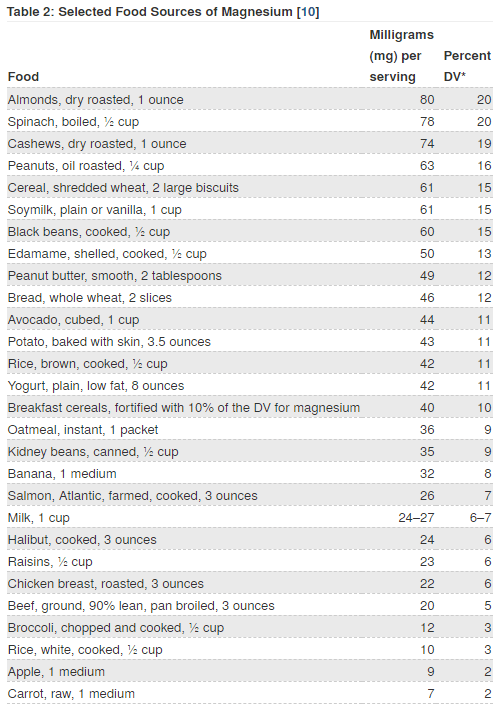- Home
- Pain Relief
- Can Magnesium Help With Migraine
COMPLETE MAGNESIUM SUPPORT
My Top Choice - Magnesium Breakthrough - The ONLY supplement with all 7 essential magnesium types in one formula. Most only have 1-2 types, leaving you deficient.
Can Magnesium Help With Migraine?
Can magnesium help with migraine attacks? The answer depends on if you are deficient or not.
Many migraine sufferers are magnesium deficient, so can magnesium help with migraine? Can it stop your next attack?
When looking for migraine causes, magnesium has become a hot topic among researchers, physicians and migraine sufferers. Some studies have led physicians to believe that a magnesium deficiency may be one of the root causes of migraines, since many migraine sufferers have low levels of magnesium.
In fact, the connection between magnesium and migraines has even led some individuals to begin taking magnesium supplements, while others focus on increasing magnesium in their diet. Are magnesium levels really tied to migraines? Can magnesium provide an effective treatment for migraines?
Let's take a closer look at this topic to help answer these questions.

What is Magnesium?
It’s a mineral that is essential to the body’s ability to produce proteins, the function of more than 300 enzyme systems, strong bones, muscle operations, energy transport and even energy production.
Magnesium is also essential for proper nerve function, a strong immune system and a healthy heart rhythm. This mineral has one of the highest levels within the body and is definitely essential for good health.
My #1 Choice in Magnesium Supplements
How Can Magnesium Help With Migraine?
So, what is the connection between magnesium and migraines?
When migraine attacks occur, some studies have shown that certain individuals have low levels of magnesium within the brain. Since magnesium is so crucial for nerve function, some physicians think that a deficiency in magnesium may be a root cause of migraines. Today, researchers are continuing to study magnesium and migraines, working to find how magnesium can be used to reduce the occurrence of migraines.
According to the National Institute of Health (NIH), "Magnesium deficiency is related to factors that promote headaches, including neurotransmitter release and vasoconstriction. People who experience migraine headaches have lower levels of serum and tissue magnesium than those who do not." [4]
The research findings on the efficacy for using magnesium for migraines is mixed. So to answer the question "Can magnesium help with migraine?" we need to dig a little deeper.
Please keep in mind that migraine supplements are not abortive, the are used for prevention. They can take some time (2-6 months) to rebalance your body’s chemistry and reach levels effective enough to reduce your migraine attacks.
Magnesium is used for prevention... it's not a cure. And it's not an abortive.
What Studies Have to Say
According to Migraine.com, one study conducted back in 1996 showed that some migraine sufferers who took magnesium supplements daily saw a reduction in the frequency of migraines after 9-12 weeks.
While about 41% of those taking the magnesium saw a reduction in migraine frequency, some experienced unfavorable side effects, such as stomach irritation and diarrhea. However, one other study performed in the same year did not show any results among migraine sufferers who took a magnesium supplement.
Studies from 1998 found that "up to 50% of patients during an acute migraine attack have lowered levels of ionized magnesium. Infusion of magnesium results in a rapid and sustained relief of an acute migraine in such patients. Two double-blind studies suggest that chronic oral magnesium supplementation may also reduce the frequency of migraine headaches."[3]
"Because of an excellent safety profile and low cost and despite the lack of definitive studies, we feel that a trial of oral magnesium supplementation can be recommended to a majority of migraine sufferers.” (source)
The NIH still says research on the use of magnesium supplements to reduce or prevent migraines is limited. [4]
"Three of four small, short-term, placebo-controlled trials found modest reductions in the frequency of migraines in patients given up to 600 mg/day magnesium. The authors of a review on migraine prophylaxis suggested that taking 300 mg magnesium twice a day, either alone or in combination with medication, can prevent migraines."
"In their evidence-based guideline update, the American Academy of Neurology and the American Headache Society concluded that magnesium therapy is "probably effective" for migraine prevention. Because the typical dose of magnesium used for migraine prevention exceeds the UL, this treatment should be used only under the direction and supervision of a healthcare provider." [4]
Now that's all a bit technical and mixed but, overall you have nothing to lose by testing it out. You might just be in the percentage that gets results. Meaning a reduction in your attacks and a reduction in the amount of pain medication you require.
And you can happily answer the question "can magnesium help with migraine?" with yes, it helps me!
41.6% did find it effective.
P.S. Try this full spectrum magnesium... I LOVE it.
My #1 Choice - Magnesium Breakthrough by BiOptimizers - combines 7 types of magnesium in a humic/fulvic monoatomic blend to optimize absorption. This is by far the best product I have found so far in terms of results.
Ways to Boost Your Magnesium Levels
Although studies are not yet conclusive on the connection between magnesium and migraines, some anecdotal evidence does show that certain individuals have experienced relief after increasing their magnesium levels.
Magnesium is important for many bodily functions, so
boosting magnesium levels by eating more foods high in magnesium may be a
great idea.
Foods high in magnesium include:
- soy products, brown rice, yogurt, milk.
- nuts* and seeds: raw almonds, cashews, Brazil nuts, pumpkin seeds and sunflower seeds. (P.S. These are easier to digest if you soak them overnight in filtered water).
- green leafy vegetables: spinach, silver beet and kale.
- whole grains: rye, quinoa, oats, wheat and buckwheat.
- legumes: peas and beans.*
- fruits: avocados*, bananas*, and dried apricots.
* These foods (or any foods for that matter) can be a migraine trigger for some people.
Supplements are also available, but it is important to consult a physician before taking any supplement. Read my post on Which Magnesium is Best for Migraines?
Important Warnings
It is important to note that magnesium, particularly when taken in high doses, may cause side effects. The most common are abdominal cramps and diarrhea. Other side effects may include low blood pressure, weak muscles, loss of appetite, mental changes, irregular heartbeat, nausea and problems breathing.
If symptoms are serious, you may need to seek emergency medical attention. Also, individuals who have been diagnosed with kidney failure should not take magnesium. Magnesium can also interact with certain medications, so consulting with your physician is very important if you want to try magnesium supplements.
So yes, it has the potential to help! But check with your doctor first, before taking any supplements... just to be sure.
My #1 Choice in Magnesium Supplements
WANT MORE TIPS? Subscribe to my newsletter and follow along on Facebook and Pinterest for all of the latest updates.
MIGRAINE RELIEF Related Articles
How to be more MIGRAINE SAVVY right now...
Can Magnesium Help With Migraine Resources:
1. Migraine.com (2016) Magnesium for the treatment of migraine headaches: an introduction [Online], Available at: https://migraine.com/migraine-treatment/natural-remedies/magnesium-for-migraine-headaches/ Accessed Feb. 4, 2018.
2. WebMD.com (2015) Magnesium [Online], Available at: https://www.webmd.com/vitamins-supplements/ingredientmono-998-MAGNESIUM.aspx?activeIngredientId=998&activeIngredientName=MAGNESIUM Accessed Feb. 4, 2018.
3. Mauskop A, Altura BM. (1998) Role of magnesium in the pathogenesis and treatment of migraines. Clin Neurosci. 1998;5(1):24-7. Review. [Online], Available at: https://www.ncbi.nlm.nih.gov/pubmed/9523054
4. National Institutes of Health, Office of Dietary Supplements (2016) Magnesium: Fact Sheet for Consumers. [Online], Available at: https://ods.od.nih.gov/factsheets/Magnesium-healthProfessional/ Accessed Feb. 5, 2018.















